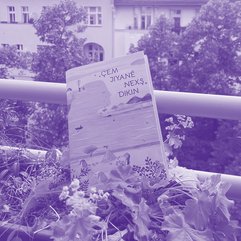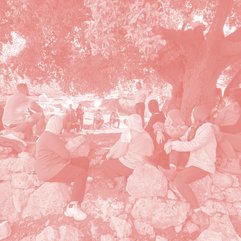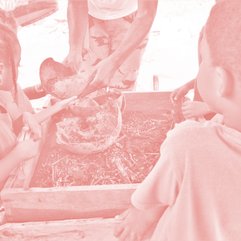Holding Up The Sky
Discussion: Beyond Nation and Violence – Othering the Family
17.00-21.00
Save the Date
all ages welcome
in German/in English

Under the motto “Holding Up The Sky”, a platform for solidarity and cultural creation within the Spore Initiative, the Spore Studio serves as an anchor point for an extensive program focused on creative explorations of family, childhood, and adultism.
For this event, we invite young people from youth welfare, cultural and social workers, politicians, and artists and all others to weave together experiences and reimagine family beyond the patriarchal welfare state: a family that does not discipline or control, but rather assures, nourishes, and plays.
We are happy Asha Hedayati will join us for the discussion. She is a lawyer, who has been working in the field of family law for almost 10 years, focusing on representing women affected by violence. She also trains social workers at women's shelters and women's counseling centers throughout Germany and is a guest lecturer on family law and child and youth welfare law at various universities.
In 2022, around 121,000 children and young people in Germany lived in residential institutions of youth welfare, with another 86,000 in foster families. During the 2025 federal election campaign, while “Bürgergeld” (basic income support) was heavily polemicized and recipients were stigmatized as “total refusers,” the perspectives of children and young people growing up in such households remained invisible. Yet around 65% of young people in youth welfare come from families dependent on transfer payments.
Polarization, blame, and the individualization of poverty, precarious working and residency conditions, and illness—as seen in the 2025 election campaign—impact young people directly. They threaten their futures, exclude them, and actively hinder their chances of building a secure life.
But what if things were different?
What would critical social work look like if it didn’t operate from a deficit-oriented perspective, but instead created spaces and possibilities beyond evaluation and economic principles? How might law and youth welfare be reimagined as systems of unconditional protection? What is needed for state support to truly work—overcoming economic and social inequality instead of reinforcing it? We are searching for places where barriers have been dismantled and spaces have opened up—where grief can be shared, and diverse forms of togetherness can find a home: intersectional, just, transformative.
With Careleaver e.V., Asha Hedayati, Solidarity Meeting for Social Work and João Albertini










